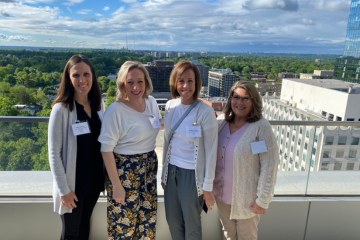In the latest 2020 “Fresh Perspectives” blog post presented by the de Beaumont Foundation, Jonathan Wetstein, MS, manager of Roots to Prevention in Camden, New Jersey, tells us how a small seed of an idea can lead to lasting community change. Wetstein is a graduate of Pennsylvania State University’s Community and Economic Development Graduate Program and carries a long-standing commitment to urban revitalization related projects.
When I came to Camden, New Jersey in 2010 to work on a capstone project for my master’s in community and economic development, I knew I wanted to impact the community but had no idea what my research would focus on. I also never imagined this academic requirement would evolve into a city-wide initiative with an operating budget exceeding $800,000 and national recognition as part of The BUILD Health Challenge.® This all became possible after asking local community development corporations how my research could benefit their communities — they all asked for more urban gardening, and I listened.
New Opportunities
While I had no farming experience, I could see that Camden was near a robust dining market in Philadelphia and that neighboring suburbs had high demands for fresh, local foods. I could also see that the city was very young, with high unemployment among its labor force, and had large concentrations of open, vacant lands. These characteristics, combined with the highest prevalence of chronic diseases in Camden County, did look grim on paper. But through the lens of food economics, they were opportunities for growth in urban agriculture.
Completion of my capstone led to funding support from Parkside Business and Community in Partnership to create new income opportunities for residents in food-growing activities. With the backing of this Camden non-profit developer, we constructed a community facility called the Parkside Learning Garden and established Roots to Market, a free training initiative that offered for-profit garden education.
At this time, Camden already had some of the highest concentrations of urban gardens per capita in the nation, but much of the food supply was donated to those in need. The challenge we faced was increasing the value of Camden produce to sustain household growers without disrupting food donations.
Moving Upstream
When Virtua Health, Southern New Jersey’s largest health care provider, opened its Camden wellness center, disease prevention and social determinants of health converged. Providing a prescription fruits and vegetables program to patients screened for food insecurity was showing success in a short amount of time. The provider sought to make this model scalable, reaching other neighborhoods also suffering the health impacts of being in a food desert.
When I first learned about the wellness center, I was eight years into this work. I also now understood the critical role urban agriculture played in chronic disease prevention: growing fresh produce improves eating habits, thus driving up both its supply and demand. I asked Virtua staff if they also could purchase produce for their programs from Camden growers. It was this conversation that led to the creation of Roots to Prevention.
By the end of 2019, this became a cross-sectoral collaboration, with a mission to demonstrate how disease prevention programs can be leveraged as community development tools. Central to this work, Camden food growers are connected to new sales channels created by the health care sector. Participants in PBCIP’s for-profit gardening training program, Roots to Market, and its gardening network through the Camden Urban Agriculture Collaborative, will soon be eligible to sell their surplus produce to Virtua’s food pantry. In addition, a local farm certified by the Department of Agriculture entered a purchasing agreement with the health system. The collaborative has also received the Department of Agriculture’s first Urban Agriculture and Innovative Production Award, which will increase the capacity of Camden residents to grow and sell fresh produce through the pilot.
Multiplying Our Impact
The most exciting component of this work was discovering what prevention efforts each organization was already working on. Every RTP partner was already connected to one segment of Camden’s population or another. Each strived to improve their respective neighborhood’s environment by promoting a culture of health. This collaboration continues to accelerate its efforts because they are building off existing relationships, community trust, and services now housed under one name.
Jonathan and two other representatives of the collaborative will be presenting at APHA 2020. View their session on Roots to Prevention on Tuesday ,Oct. 27, from 11:15 a.m. to 11:30 a.m.
This blog post was first published on APHA’s Public Health Newswire.





